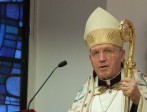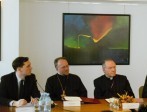Mr. Prime Minister,
Mr. President of the Constitutional Court,
Your Excellency the Apostolic Nuncio,
Ministers and members of the Government,
Your Excellencies the Ambassadors and other Representatives of friendly States,
Members of the National Assembly and of the European Parliament,
Members of the Slovenian Army and the Slovenian Police,
Distinguished guests,
My brothers Bishops, Priests and Deacons,
Sisters and Brothers,
And Friends!
The rhetorical question of Jesus, “Is not life more than food and the body more than clothing?” is the key to a correct understanding of the Gospel passage that we have just heard. This does not suggest we should live irresponsibly and rely brazenly on God's generosity to provide us with whatever we need to live. It does not mean that we should not use the gifts and talents that God has given us to help ourselves meet our needs but instead become a burden to others. On the contrary, it is a summons that we set ourselves a correct scale of values to show us what a goal is and what a means is. The words of Jesus Christ clearly show that life is the aim, while food, drink and clothing are only means for sustaining life. We do not live in order to acquire material goods, but we use material goods to live our lives in their fullness, in accord with the dignity of each human person.
In the current social environment that we call consumer society we can no longer clearly distinguish between a goal and a means. Do we live in order to acquire material goods, or do we acquire material goods in order to live? Everything depends on a clear and consistent answer to this question. If acquisition of goods becomes our goal, we will subjugate our lives to it, and not only our lives but also those of others. We cannot find a more cold-blooded and relentless tyrant than acquisitiveness, for which nothing is sacred and inviolable, which in turn is the reason for the warning against the danger of its dictatorship that Jesus is giving us so decisively. Material means must remain means and be at the service of life, and not the other way around; life must not be at the service of material goods.
Jesus is not saying that we do not need material goods. On the contrary, he is stressing that it is God's will for us to have them; God Himself is granting them to us. However, he is not telling us that we should idly wait for the necessary goods to fall into our laps by themselves. He wants us to look beyond securing our livelihoods as we use our effort, prudence and caution to provide for today and tomorrow.
However, far more important than our livelihood alone is the question regarding the meaning of our lives and the ultimate purpose for which we live. We need to answer this question in order to bring meaning and true happiness to our daily cares and concerns for our livelihoods. For only when we find the true meaning of life, which Jesus calls »The Kingdom of God and its righteousness,« will we know how to gain and use all that we need for our livelihoods.
If our goals and ultimate purpose are clear to us, and if the essential values that make our lives worth living are clear to us, then we will know how to find and walk the ways to them. However, if our final goals and core values become uncertain, if we do not know the direction in which to look for them, or if we begin to doubt their existence, then we begin to live only for the moment and lose sight of the most important reference point and direction. If there is no goal beyond the means, then the means themselves become the goal. If there is no purpose in life beyond the material goods we use to sustain meaningful lives, then the material goods become the sole purpose and value of our lives.
Modern consumerism has been linked to the loss of clear conscience and faith in the values of life that transcend life itself and which would be worth giving life for. Hence, governments should also be concerned whether and how citizens are seeking and finding the ultimate meaning of their lives, for the consequences are not negligible for the State. If we call the search for the ultimate meaning of life spirituality, the State has no right to disregard the importance of spirituality. Spirituality is not a leisure-time activity but deserves at least as much attention and incentive as any of the other pursuits, for in the eyes of citizens it gives their worldly pursuits a joyful meaning of life.
The Scripture reading gives us a moving story about the young King Solomon, who is not asking for military or political success, or for a long life and riches, but first and foremost for wisdom. It already is a sign of great wisdom that he is putting it in the first place and asking for it first, rather than asking for success at any cost.
Again, this does not mean that success is not important, if we wish to accomplish something good. It only means that success is just a means and not an end, that it is determined by conditions and criteria outside of itself. Wisdom, to which the young King Solomon is giving priority over riches and military victories, as well as the Kingdom of God and its righteousness that Jesus Christ is proclaiming, are the necessary moral values that prevent the success in earthly endeavours from turning into a curse but enable it to serve true life in all its fullness and the promises it is carrying within it.
The crisis that we are experiencing and the necessity of solutions that we are sensing are calling for success of the measures taken for coping with it. However, if the lack of wisdom, for which the young King Solomon asked, and of the righteousness of the Kingdom of God, which Jesus Christ is proclaiming, have led us into today's crisis, then it is incumbent upon us that we make the promotion of moral values and spiritual wisdom constitutive part of our efforts to overcome this crisis and to prevent it from recurring. After all, only spiritual wisdom is capable of placing material goods, riches and any kind of social and technological success in their proper perspective. If we have reached the conclusion that seeking wisdom already is a sign of wisdom, it follows then that disregarding the wisdom of life is a worrisome sign of a lack of wisdom. Spiritual values are therefore not a matter of passing importance but a key human issue; therefore the freedom of religion and free exercise thereof, which is crucial for faith, religion and spirituality, is one of the basic human rights, given to us by the laws of man and the Law of God. Amen.
Msgr. Anton Stres, Ph. D.
Metropolitan Archbishop of Ljubljana and
President of the Slovenian Bishops' Conference




